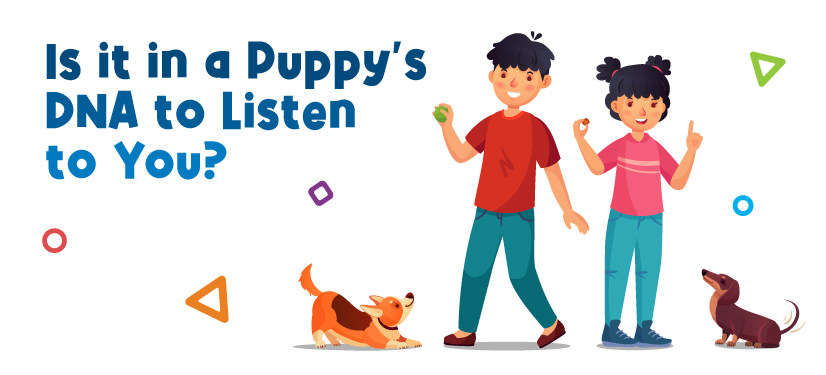
If you have ever had a dog as a pet or if you have even interacted with one, you would have noticed that they respond well to your cues – both verbal and nonverbal. “Sit down boy,” will make the canine sit and we all know how they are more than enthusiastic to play fetch!
You also know that dogs are one of the easiest animals to communicate with. Have you wondered why? Is it because we have trained them well? Or are they genetically hardwired to respond to us?
Latest research from the Arizona University shows that they are born to communicate with humans – right from when they are puppies! This means that they are genetically wired to talk to us!
In other words, that adorable eye contact that they make comes naturally to them.
This was concluded by a team headed by Emily Bray, a post-doctoral research associate at the Arizona Canine Cognition Center at the University of Arizona’s School of Anthropology .
They conducted this research with 375 pups as young as eight weeks old. The pups had not not interacted with humans prior to the experiment.
These pups were from California-based organisation Canine Companions, which trains service dogs.
“At the time of the study, the puppies were still living with their littermates and had not yet been sent to live with a volunteer puppy raiser. Therefore, their interactions with humans had been limited, making it unlikely that the behaviors were learned,” she added.
What were the tasks?
So how did the researchers work with the pups and come up with these findings?
Of course, they guided them to a treat!
The pups had to identify a treat, taped to the inside of inverted cups. The researchers had to evaluate the difference in results between pointing at the cups and pups relying on their own instincts.
To make sure that they didn’t sniff their way into the treats, they ensured that it was well hidden.
Surprisingly, 67% of the time, they were able to understand when pointed to the cups! It means that they could understand human sign language like finger-pointing.
To make sure the puppies did not select just by chance, they were asked to do the same task 12 times!
The result was that the puppies were consistently able to find their way to the treats hidden in the cups. They also did not get better with practice. This means that they were inherently able to follow directions from humans and did NOT get better with repeated trials.
There were other tests where the pups were tested for their response to verbal cues and if they wanted to initiate conversation with the ‘hoomans’ around!

The pups could understand humans
In one such test, the puppies were tested to maintain eye contact with humans and they proved successful.
This is a crucial trait that proves that they are wired to communicate with humans.
Well, it may seem like these are just puppy steps, but further research can help us gauge how effectively they can understand us humans!
However, these furballs did not know how to initiate communication with humans. When the researchers set up tasks that were difficult for the puppies to complete independently, they looked at their hooman for just a second. But, older dogs tended to reach out more often.
This shows that while puppies may be born knowing how to respond to human-initiated communication, the ability to initiate communication on their own may come later.
What are the findings?
With these observations, the researchers took the pedigree (breed) information into consideration to understand which breeds of pups were more likely to be wired to talk to us. More importantly, they wanted to understand how far genetics has influenced their ability to communicate.
It was inferred that 40% of the variation in performance was hereditary. Researchers believe that this is a significant figure. “Around 40 percent heritability is an incredible number,” says Bridgett vonHoldt, a geneticist studying dogs and wolves at Princeton University, according to a quote in the Smithsonian Magazine.
Now that there is proof that the puppies’ ability to communicate with humans is hereditary, what’s next? The researchers from University of Arizona are now trying to conduct related tests on older dogs to trace which genes actually account for this trait.
How will the research benefit us?
For those of us who are wondering why dogs were domesticated so easily, this finding could well be a missing piece.
Besides, finding out which breeds are genetically more likely to effectively communicate with humans will help us train service dogs more effectively. Those breeds will be trained to be service dogs and probably sniff out crime much better in the future!

Pups that communicate well early on become service dogs of good calibre
Infact, there is further research that is being carried out on the bonding between pups and children and expanding the scope of training dogs to talk to humans.
What are some unique, fun aspects of your canine communicating with you? Share your answers with us in your comments.
Aparna is a mom, singer and dreamer. At BYJU'S, she writes stories about learning for children. She believes in the power of music, especially ghazal, the magic of the universe and happy learners. When not writing or singing, you will find her intensely engaged in conversations about life and the power of words.